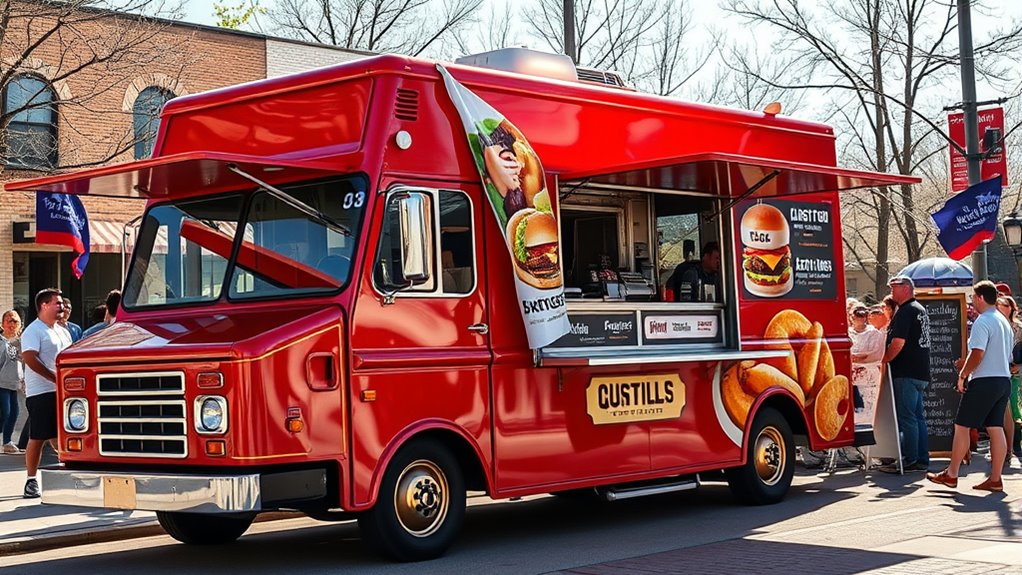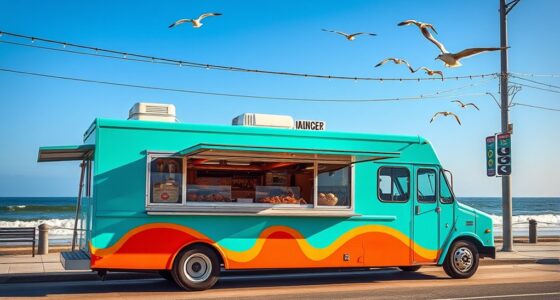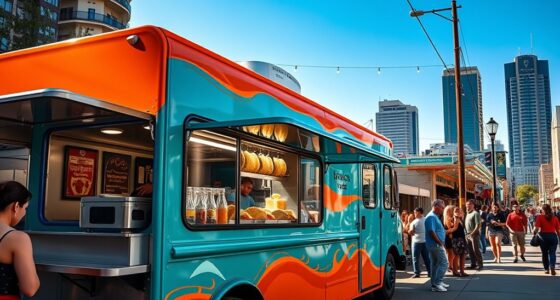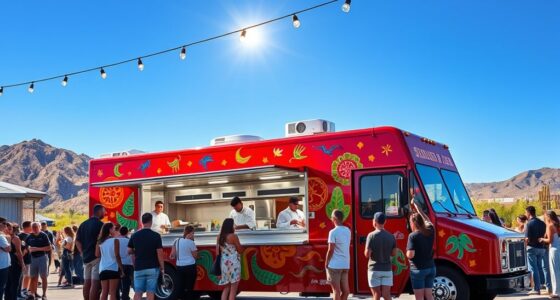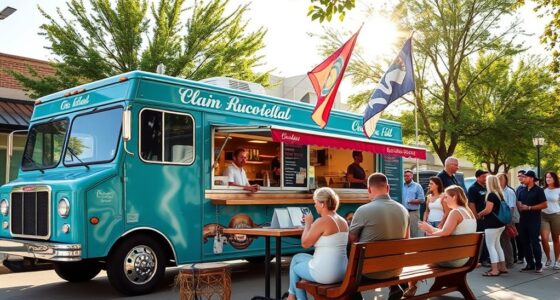To start a food truck in Springfield, MO, you’ll need to understand local tastes and community preferences. Secure the necessary permits and comply with Springfield’s zoning laws and health inspections. Choose a licensed shared kitchen, plan your menu with local ingredients, and invest in eye-catching branding. Use social media to connect with locals and participate in community events to boost visibility. Keep learning more tips to help turn your food truck dream into reality.
Key Takeaways
- Understand Springfield’s local regulations, permits, and zoning laws for food truck operations.
- Develop a community-focused menu highlighting regional flavors and sourcing local ingredients.
- Choose a licensed shared kitchen and secure necessary licenses and insurance for compliance.
- Design eye-catching branding, signage, and utilize social media to promote your food truck locally.
- Participate in community events and build customer loyalty through rewards and local collaborations.
Starting With Local Cuisine Trends
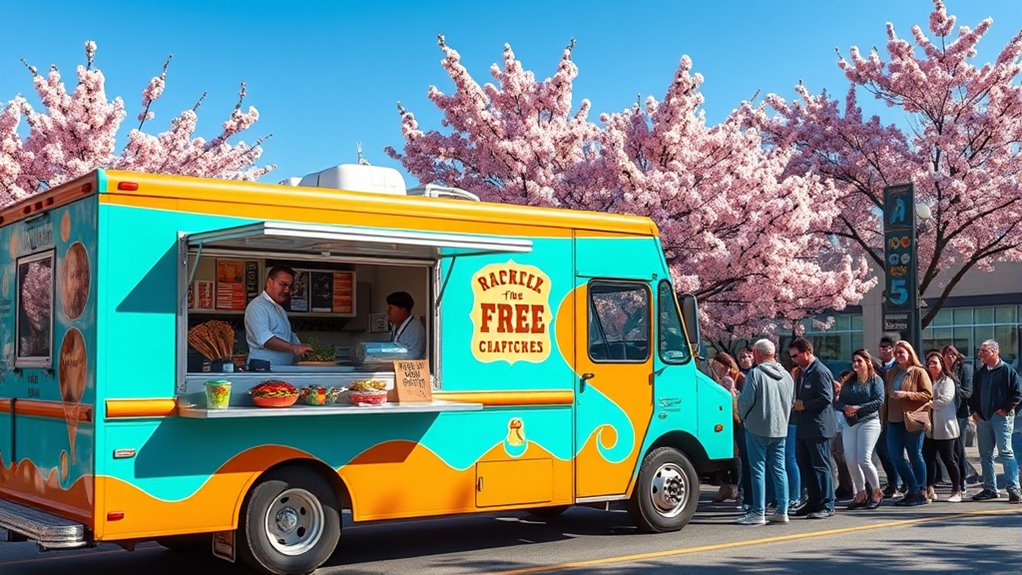
To succeed with your food truck in Springfield, it’s essential to start by embracing local cuisine trends. This means highlighting regional flavors that resonate with the community, making your food stand out. Effective food truck branding plays a crucial role here—use authentic visuals and messaging that reflect Springfield’s culinary identity. Additionally, social media marketing helps you connect with locals and showcase your unique offerings. Share behind-the-scenes content, customer testimonials, and daily specials to build excitement and loyalty. By aligning your menu and branding with local tastes, you attract more customers who feel a connection to your brand. Incorporating regional culinary influences into your menu can elevate your brand and create a memorable experience for your patrons. Remember, staying current with local food trends not only boosts your visibility but also positions your truck as a staple in Springfield’s vibrant food scene.
Understanding Local Requirements
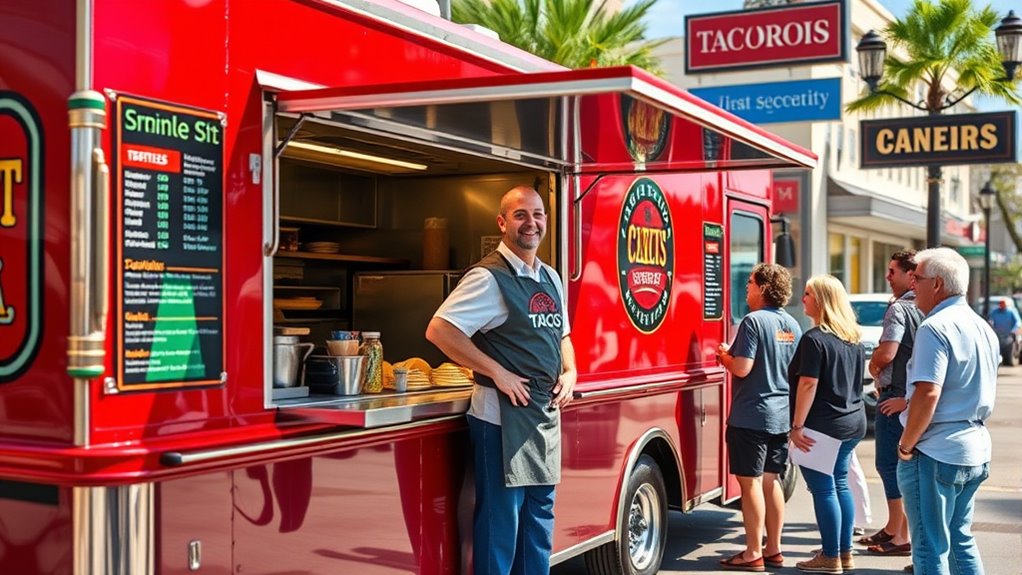
To get started, you need to understand Springfield’s food truck permit process and what inspections are required. It’s also important to know where you can park your truck, as specific zones are designated for food vendors. Making sure you comply with these local requirements will help you avoid delays and ensure your truck runs smoothly. Additionally, understanding zoning laws can help you identify permissible areas for operating your food truck within Springfield.
State Food Truck Permit Process
Understanding the state food truck permit process is essential before hitting the streets of Springfield, MO. To operate legally, you need to secure the appropriate food truck permits, which guarantee compliance with local regulations. Start by visiting the Missouri Department of Health and Senior Services website to understand statewide requirements, including food safety standards and vehicle inspections. You’ll also need to complete an application and pay any applicable fees. Keep in mind that local regulations may impose additional rules, so coordinate with Springfield’s city offices to confirm all permits are in order. Failing to obtain the proper permits can lead to fines or shutdowns. By thoroughly understanding the state food truck permit process, you’ll ensure your business runs smoothly from day one.
Schedule Inspection Frequency and Requirements
Scheduling regular inspections is essential to keep your Springfield food truck compliant with local health and safety standards. The inspection schedule varies based on your food truck’s operations, but typically includes routine checks to ensure hygiene, equipment, and food handling meet state and local regulations. Understanding inspection requirements helps you prepare ahead of time, avoiding violations or closures.
Be aware of:
- Frequency of inspections mandated by Springfield health authorities
- Necessary documentation and permits during inspections
- Specific sanitation standards your truck must meet
- Procedures for addressing inspection deficiencies
Staying ahead of your inspection schedule and requirements ensures smooth operations, reduces the risk of fines, and keeps your customers safe. Regular inspections are a key part of your food truck’s success and compliance.
Designated Street Parking Zones
Knowing where you can park your food truck is vital for staying compliant with Springfield’s local regulations. Springfield designates specific street parking zones where food trucks are allowed, so it’s important to understand these designated areas. Parking regulations specify which streets permit commercial vehicles, often indicated by clear street signage. Pay close attention to posted signs that outline parking durations, restrictions, and any special permits required. Ignoring street signage can lead to fines or towing, so always verify that your chosen spot aligns with local rules. Before setting up, double-check local ordinances to confirm your parking zone is approved for food truck operations. Staying informed about designated street parking zones helps you avoid violations and keeps your business running smoothly.
Setting Up Your Base of Operations
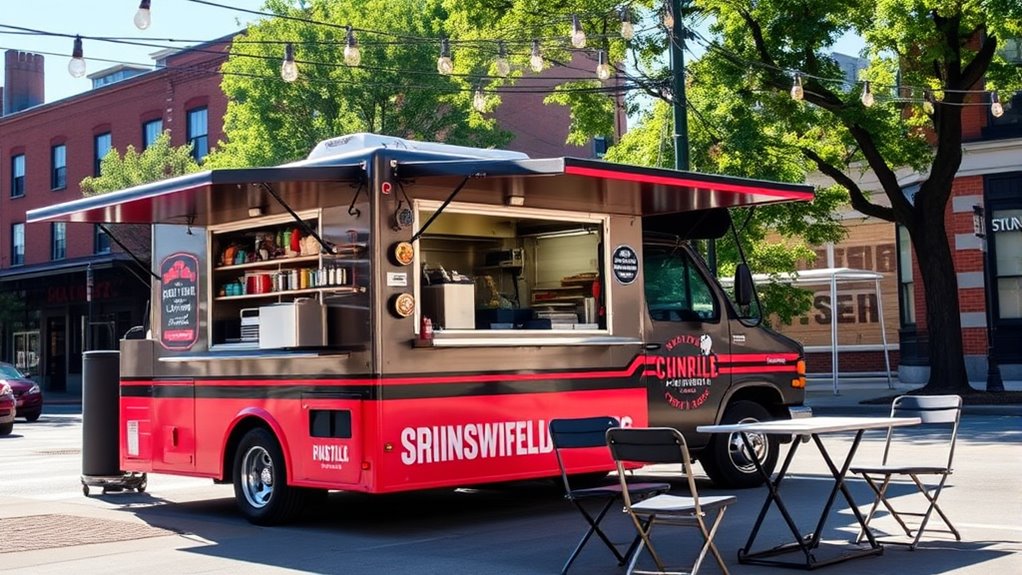
You’ll need to choose the right space to operate your food truck, and shared kitchen licensing options can safeguard you time and money. Selecting the proper kitchen equipment ensures your setup is efficient and meets health standards. By carefully considering these factors, you’ll establish a solid base for your food truck business in Springfield. Using professional-grade equipment can improve your workflow and ensure consistent quality in your offerings.
Shared Kitchen Licensing Options
Setting up your base of operations often involves choosing between different shared kitchen licensing options, which can simplify the process of starting your food truck in Springfield, MO. A shared kitchen, or food truck co-op, allows you to operate legally without investing in a dedicated space. These facilities are licensed for shared use, saving you time and money. You can rent space by the hour or day, depending on your needs. Many co-ops also offer essential amenities like refrigeration, prep stations, and cleaning facilities. This flexibility helps new food truck owners get started quickly. When exploring shared kitchen licensing, consider factors like location, cost, available equipment, and scheduling options to find the best fit for your business.
Custom Kitchen Equipment Selection
How do you choose the right kitchen equipment for your food truck in Springfield, MO? Start with a custom kitchen designed for your menu and space constraints. Focus on essential equipment that boosts efficiency and meets health standards. Your equipment selection should include items like grills, fryers, prep tables, and refrigeration units. Consider your menu needs and traffic flow to avoid overcrowding. Here’s a quick overview:
| Equipment Type | Purpose | Key Features |
|---|---|---|
| Grill | Cook meats, veggies | Compact size, even heat distribution |
| Refrigerator | Store perishables | Good insulation, easy access |
| Prep Tables | Food assembly | Durable surface, storage options |
| Deep Fryer | Fried foods | Safety features, size options |
Choosing the right custom kitchen equipment helps streamline your operations and ensures top-quality food service.
Budgeting and Financing Your Food Truck
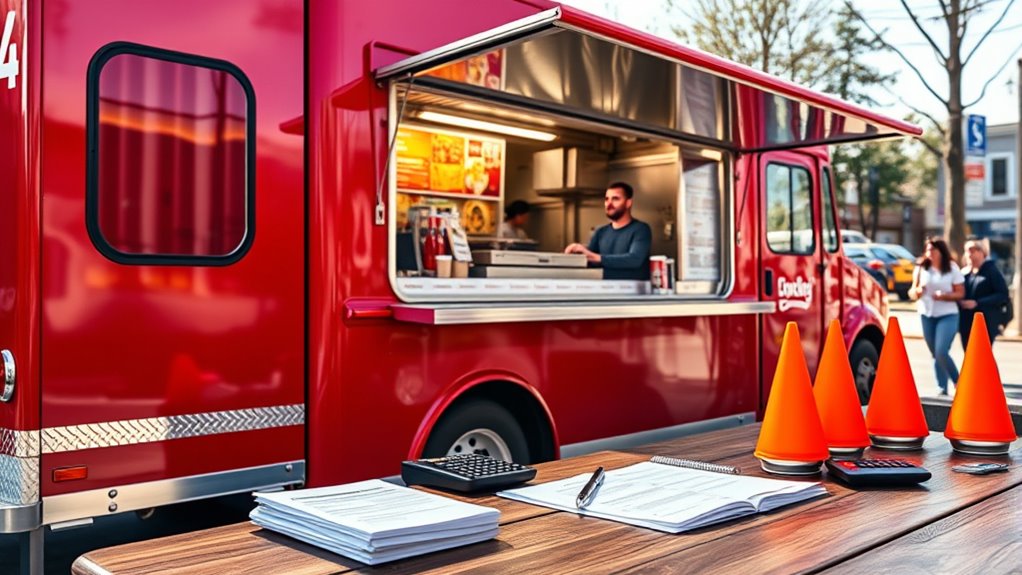
To get your food truck rolling, you’ll need to budget for vehicle customization costs and explore local bank small business loans. Protect your investment with liability insurance designed for food trucks. Understanding these financial aspects helps you start strong and stay prepared. Additionally, researching top-rated colognes can help you present a professional and confident image as you build your new business.
Initial Vehicle Customization Costs
Customizing your food truck is a significant upfront expense that requires careful budgeting. The initial vehicle customization costs can vary widely depending on your vision and needs. A professional vehicle wrap can range from $2,500 to $5,000, transforming your truck’s appearance and attracting customers. A quality paint job might cost between $1,000 and $3,000, giving your truck a fresh, eye-catching look. Other costs include installing kitchen equipment, shelving, and signage. Keep in mind that these expenses can add up quickly, so plan accordingly.
- Vehicle wrap design and installation
- Paint job quality and finish
- Kitchen equipment upgrades
- Signage and branding materials
Local Bank Small Business Loans
Securing funding is a key step after estimating your vehicle customization costs. Local banks often offer small business loans tailored for entrepreneurs like you. These loans can help cover expenses related to sourcing regional ingredients and developing menus that showcase Springfield’s local cuisine. To improve your chances, prepare a solid business plan highlighting your focus on regional ingredients and community appeal. Approach your bank with a clear budget, including vehicle modifications, permits, and initial inventory. Many local banks are supportive of small businesses that boost the local economy and celebrate regional flavors. Keep in mind, loan approval depends on your credit history and financial stability. With the right documentation and a compelling plan, you can secure the funds needed to launch your food truck successfully.
Liability Insurance for Food Trucks
Liability insurance is a crucial expense to contemplate when budgeting for your food truck, as it protects you from potential claims related to accidents or damages during operations. Without proper liability insurance, a single mishap could threaten your food truck branding and financial stability. It helps cover medical bills, property damage, and legal costs, giving you peace of mind. When selecting liability insurance, consider coverage limits and exclusions specific to food trucks. Additionally, understanding local requirements in Springfield, MO, ensures you’re compliant. Proper insurance not only safeguards your business but also enhances your credibility with customers. Keep in mind, insurance costs vary based on truck size, location, and coverage level. Budget wisely to ensure your food truck remains protected and ready to serve, regardless of unforeseen challenges.
Designing Your Menu and Pricing Strategy
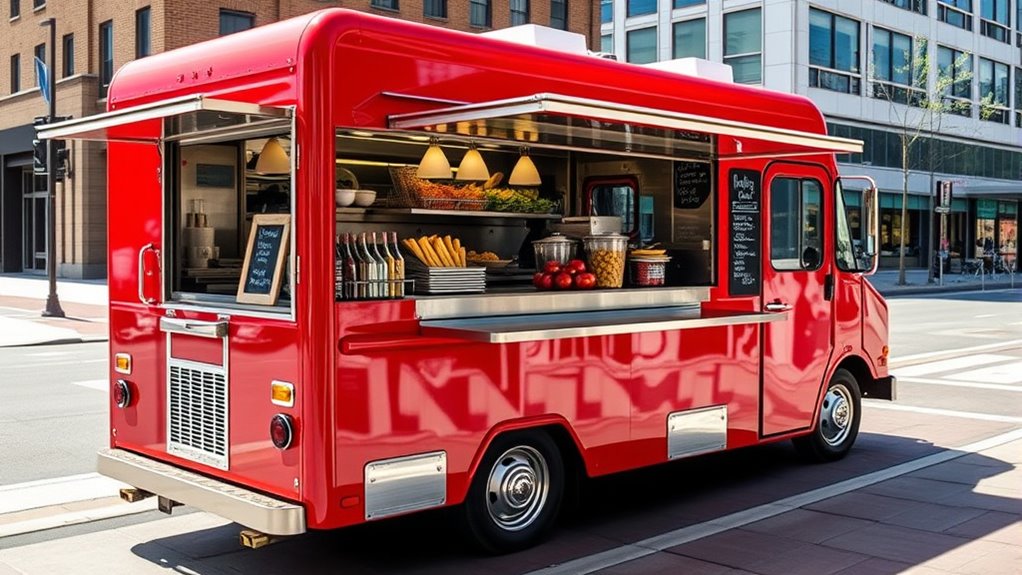
You need to choose ingredients that are fresh and locally sourced to appeal to your customers and support local producers. Calculating ingredient costs accurately helps you set prices that cover expenses while staying competitive. By focusing on these points, you can create a menu that’s both appealing and profitable. Incorporating cost-effective tuning options can also optimize your operational efficiency and enhance your overall business performance.
Locally Sourced Ingredient Selection
Choosing locally sourced ingredients can considerably elevate your menu and attract customers who value fresh, community-oriented food. By establishing strong sourcing partnerships with local farmers and producers, you guarantee ingredient freshness and support the Springfield food scene. These partnerships help you access seasonal items, reduce transportation time, and guarantee quality. Incorporating fresh, local ingredients into your dishes appeals to health-conscious customers and differentiates your truck from competitors. Be intentional about menu design, highlighting local produce and specialty items. Regularly visit farmers’ markets or collaborate with nearby farms to keep your offerings innovative and fresh. Remember, consistent ingredient freshness not only enhances flavor but also builds trust with your customers, encouraging repeat visits and positive word-of-mouth.
- Build relationships with local farmers and vendors
- Focus on seasonal, fresh ingredients
- Highlight local sourcing on your menu
- Ensure consistent ingredient quality
Ingredient Cost Calculation Methods
Accurately calculating ingredient costs is essential for setting profitable menu prices and ensuring your food truck remains sustainable. To do this effectively, you need a solid method for ingredient cost calculation. Start by tracking your ingredient sourcing costs, including purchase prices and portion sizes. Perform a detailed cost analysis for each menu item, breaking down the total ingredient costs into per-serving amounts. This helps you understand your profit margins and adjust prices accordingly. Keep in mind that fluctuating prices from suppliers can impact your calculations, so regularly update your data. Using these methods allows you to price your dishes competitively while maintaining profitability, giving you better control over your food truck’s financial health and long-term success.
Technology and Operations
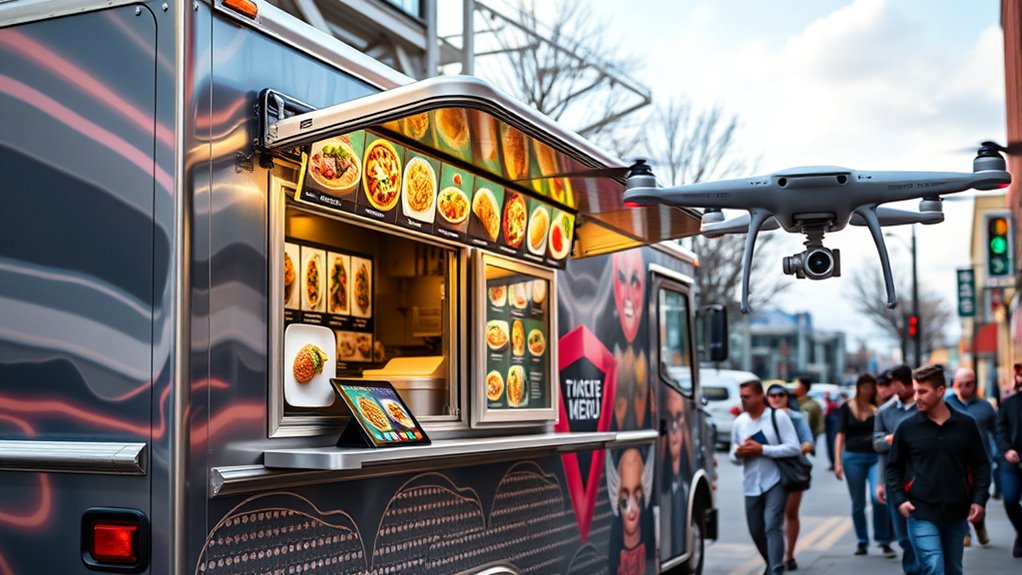
Using mobile payment apps that are compatible with your system makes transactions smoother for customers. Real-time stock tracking software helps you stay on top of inventory and avoid shortages. Both tools are essential for running an efficient, customer-friendly food truck operation in Springfield.
Mobile Payment App Compatibility
Ensuring your food truck’s payment system is compatible with popular mobile payment apps is essential for smooth transactions and customer satisfaction. With contactless payments becoming the norm, integrating mobile payment options offers convenience and efficiency. Customers expect quick, secure options like Apple Pay, Google Pay, or Samsung Pay at checkout. To achieve seamless mobile payment integration, check that your point-of-sale system supports these apps. This compatibility reduces wait times and enhances the customer experience.
- Supports multiple mobile payment apps
- Ensures secure contactless transactions
- Simplifies payment processing
- Boosts customer trust and loyalty
Real-Time Stock Tracking Software
Implementing real-time stock tracking software is essential for managing your food truck’s inventory efficiently. It allows you to monitor stock levels instantly, reducing the risk of shortages or overstocking. With accurate inventory management, you can streamline your operations and avoid last-minute trips to suppliers. The software also enhances supply chain logistics by providing real-time updates on ingredient availability and delivery schedules. This helps you plan better, minimize waste, and keep your menu consistent. Additionally, real-time data gives you insights into popular items, enabling you to adjust stock accordingly. By integrating this technology, you gain control over your inventory and can respond quickly to changing demands, ensuring your food truck runs smoothly and profitably.
Marketing and Growing Your Presence
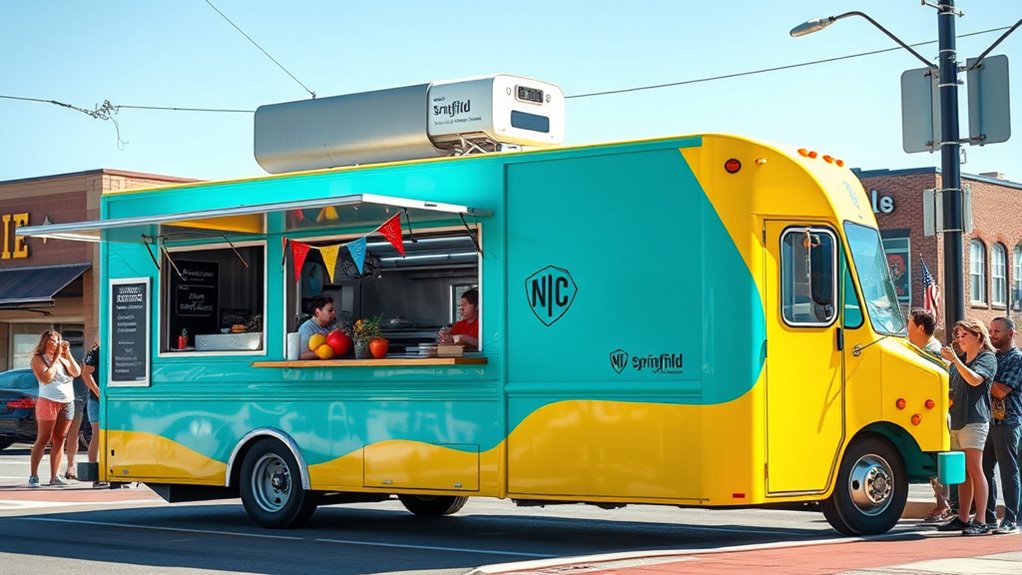
To grow your food truck’s presence in Springfield, MO, focus on connecting with popular local event venues to boost visibility. Implement customer loyalty programs to encourage repeat business and build a dedicated following. These strategies help you attract new customers and keep your regulars coming back.
Popular Local Event Venues
Partnering with popular local event venues can considerably boost your food truck’s visibility in Springfield, MO. These venues attract diverse crowds, offering prime opportunities for effective food truck branding. By securing spots at farmers markets, festivals, concerts, and sports events, you position your menu innovation in front of potential loyal customers. To maximize success, consider customizing your offerings to fit the event vibe, making your truck memorable. Focus on eye-catching signage and consistent branding to stand out. Building relationships with venue organizers can lead to repeat opportunities, increasing your exposure. Remember, the more strategic your partnerships, the stronger your presence becomes in Springfield’s vibrant food scene.
- Farmers markets and food festivals
- Community concerts and outdoor events
- Sporting events and tailgate parties
- Art walks and cultural festivals
Customer Loyalty Programs
Building a strong customer base is essential for growing your food truck’s presence in Springfield, MO, and loyalty programs are a powerful way to do that. Loyalty rewards encourage repeat visits and increase customer retention by rewarding loyal customers with discounts, free items, or exclusive offers. You can implement a punch card system or a digital app to track visits easily. When customers feel appreciated through these programs, they’re more likely to choose your truck over competitors. Consistent engagement through loyalty rewards helps establish a connection and builds trust. Over time, this not only boosts customer retention but also turns satisfied customers into brand ambassadors. Focus on creating simple, attractive loyalty programs that make your customers feel valued and motivated to keep coming back.
Springfield Food Truck Success Tips
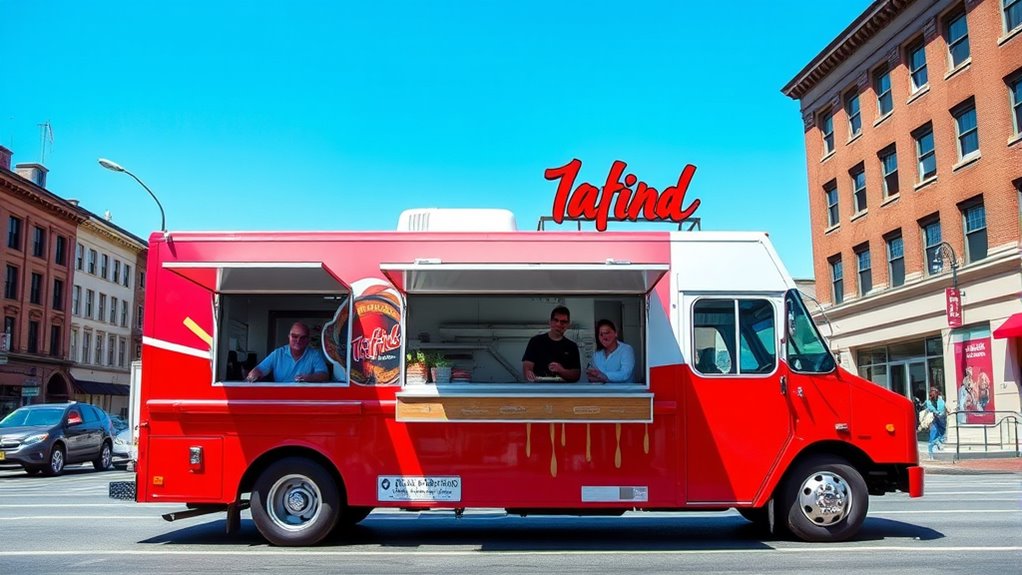
Success with your Springfield food truck hinges on understanding the local market and delivering what customers crave. To stand out, develop strong food truck branding that resonates with the community. Use social media strategies to promote your unique offerings, share behind-the-scenes content, and engage with followers. Building an authentic online presence helps attract loyal customers and increases visibility. Focus on consistency in your branding and messaging to create recognition and trust. Additionally, gather feedback regularly to refine your menu and service. Here are some key tips:
Understanding your Springfield market and engaging authentically builds loyal customers and boosts visibility.
- Leverage social media platforms to connect with Springfield locals
- Create eye-catching branding that reflects your cuisine
- Offer specials tailored to local tastes
- Engage with your community through events and collaborations
Frequently Asked Questions
What Permits Are Needed Specifically for Food Trucks in Springfield?
You’ll need to obtain food truck licensing from the Springfield city government and guarantee your vehicle meets health department regulations. This includes passing a mobile food unit inspection, securing a food handler’s permit, and registering your business. You also need a permit for parking and operating within city limits. Staying compliant with health department standards guarantees your food truck stays legal and safe for customers.
How Can I Find Reliable Food Truck Suppliers in Springfield?
To find reliable food truck suppliers in Springfield, you should explore various vendor options and read supplier reviews online. Visit local food service directories, attend industry events, and ask fellow food truck owners for recommendations. You can also check social media groups dedicated to Springfield food businesses. By comparing vendor options and reviewing feedback, you’ll identify trustworthy suppliers who provide quality ingredients and equipment, ensuring your food truck runs smoothly.
Are There Any Local Food Truck Associations or Networking Groups?
Yes, Springfield has vibrant food truck networking and associations that can be your guiding stars. Joining groups like the Missouri Food Truck Association or local Springfield food truck meetups helps you connect, share tips, and stay informed about events. These Springfield associations are invaluable, acting as a compass for your journey. Get involved to build relationships, learn from others, and grow your food truck business in the heart of Missouri.
What Are Common Challenges Faced by Springfield Food Truck Owners?
You’ll face challenges like maneuvering parking regulations, which can restrict where you operate, and keeping up with equipment maintenance to guarantee your truck runs smoothly. Managing these issues takes planning and persistence. Staying informed about local laws helps avoid fines, while regular maintenance prevents breakdowns. By tackling these common hurdles head-on, you’ll keep your Springfield food truck thriving and serving delicious food without interruptions.
How Does Springfield’s Weather Impact Food Truck Operations Seasonally?
Springfield’s seasonal weather keeps you on your toes, with hot summers and chilly winters. Temperature fluctuations can slow down your food truck’s busiest times or make setup tricky. In summer, you deal with heat, but in winter, freezing temperatures may force you to close temporarily. Being adaptable helps you navigate these changes, ensuring your truck runs smoothly year-round despite Springfield’s unpredictable weather swings.
Conclusion
Starting a food truck in Springfield, MO, is an exciting venture. Did you know that food trucks generate over $1.2 billion annually across the U.S.? With the right local focus, a solid plan, and creative marketing, you can turn your passion into profit. Keep adapting to trends and engaging with the community. Your food truck journey can be both rewarding and profitable—so get started today and watch your business thrive in Springfield’s vibrant scene.
